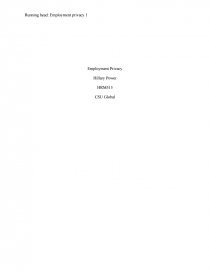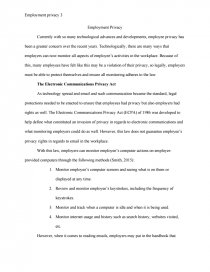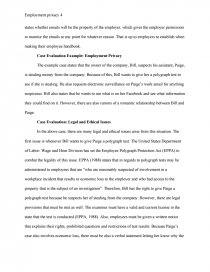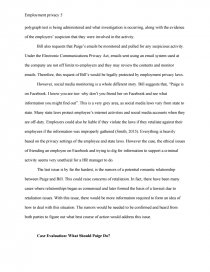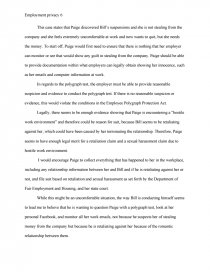Hrm 515 - Employment Privacy
Essay by hilarialovesyou • March 5, 2017 • Research Paper • 1,230 Words (5 Pages) • 1,011 Views
Employment Privacy
Hillary Power
HRM515
CSU Global
Employment Privacy
Currently with so many technological advances and developments, employee privacy has been a greater concern over the recent years. Technologically, there are many ways that employers can now monitor all aspects of employee’s activities in the workplace. Because of this, many employees have felt like this may be a violation of their privacy, so legally, employers must be able to protect themselves and ensure all monitoring adheres to the law.
The Electronic Communications Privacy Act
As technology spread and email and such communication became the standard, legal protections needed to be enacted to ensure that employees had privacy but also employers had rights as well. The Electronic Communications Privacy Act (ECPA) of 1986 was developed to help define what constituted an invasion of privacy in regards to electronic communications and what monitoring employers could do as well. However, this law does not guarantee employee’s privacy rights in regards to email in the workplace.
With this law, employers can monitor employee’s computer actions on employer-provided computers through the following methods (Smith, 2015):
- Monitor employee’s computer screens and seeing what is on them or displayed at any time.
- Review and monitor employee’s keystrokes, including the frequency of keystrokes.
- Monitor and track when a computer is idle and when it is being used.
- Monitor internet usage and history such as search history, websites visited, etc.
However, when it comes to reading emails, employers may put in the handbook that states whether emails will be the property of the employer, which gives the employer permission to monitor the emails at any point for whatever reason. That is up to employers to establish when making their employee handbook.
Case Evaluation Example: Employment Privacy
The example case states that the owner of the company, Bill, suspects his assistant, Paige, is stealing money from the company. Because of this, Bill wants to give her a polygraph test to see if she is stealing. He also requests electronic surveillance on Paige’s work email for anything suspicious. Bill also states that he wants to see what is on her Facebook and see what information they could find on it. However, there are also rumors of a romantic relationship between Bill and Paige.
Case Evaluation: Legal and Ethical Issues
In the above case, there are many legal and ethical issues arise from this situation. The first issue is whenever Bill wants to give Paige a polygraph test. The United States Department of Labor- Wage and Hour Division has set the Employee Polygraph Protection Act (EPPA) to combat the legality of this issue. EPPA (1988) states that in regards to polygraph tests may be administered to employees that are “who are reasonably suspected of involvement in a workplace incident that results in economic loss to the employer and who had access to the property that is the subject of an investigation”. Therefore, Bill has the right to give Paige a polygraph test because he suspects her of stealing from the company. However, there are legal provisions that must be met as well. The examiner must have a valid and current license in the state that the test is conducted (EPPA, 1988). Also, employees must be given a written notice that explains their rights, prohibited questions and restrictions of test results. Because Paige’s case also involves economic loss, there must be also a verbal statement letting her know why the polygraph test is being administered and what investigation is occurring, along with the evidence of the employers’ suspicion that they were involved in the activity.
Bill also requests that Paige’s emails be monitored and pulled for any suspicious activity. Under the Electronic Communications Privacy Act, emails sent using an email system used at the company are not off limits to employers and they may review the contents and monitor emails. Therefore, this request of Bill’s would be legally protected by employment privacy laws.
However, social media monitoring is a whole different story. Bill suggests that, “Paige is on Facebook. I know you are too- why don’t you friend her on Facebook and see what information you might find out”. This is a very grey area, as social media laws vary from state to state. Many state laws protect employee’s internet activities and social media accounts when they are off-duty. Employers could also be liable if they violate the laws if they retaliate against their employees if the information was improperly gathered (Smith, 2015). Everything is heavily based on the privacy settings of the employee and state laws. However the case, the ethical issues of friending an employee on Facebook and trying to dig for information to support a criminal activity seems very unethical for a HR manager to do.
...
...
